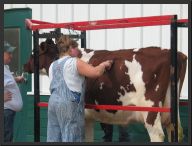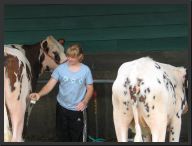 |
 |
My father emailed these photos from Tuesday’s World Dairy Expo. More pictures here.
 |
 |
My father emailed these photos from Tuesday’s World Dairy Expo. More pictures here.
Apprentices leave the program at the end of their six-month term proficient at pest control, propagation, irrigation and maintaining soil fertility with organic matter. They also leave with a network of instructors, farmers and former apprentices to turn to when questions arise, and they often leave with a job offer in hand from a contact made at the apprenticeship. Most importantly, they leave firmly committed to practicing and promoting agricultural systems that work within the limitations imposed by natural resource cycles.
UC Santa Cruz’s Apprenticeship in Environmental Horticulture evolved from student interest in the 3-acre garden installed on campus by Alan Chadwick in the late 1960s. Using only hand tools and organic soil amendments, Chadwick molded a steep hillside near what was then the center of campus into a highly productive vegetable, fruit and flower garden.
U.S. Senator Russ Feingold and Congressman Dave Obey announced today that the Ginseng Board of Wisconsin has received a Technical Assistance for Specialty Crops (TASC) Program grant of $76,500 from the U.S. Department of Agriculture (USDA). The grant will help Wisconsin ginseng producers continue to produce blemish-free ginseng while maintaining low chemical residues to help overcome international barriers to their product. Feingold and Obey have long worked to protect both Wisconsin ginseng growers and their produce with truth in labeling legislation. In April of this year, Feingold and Obey introduced, in their respective houses, truth in ginseng labeling legislation to protect producers and consumers of ginseng.
Michele Norris (audio):
ome supermarkets are having trouble stocking organic milk as demand has outstripped supply. And strict organic regulations make it difficult to increase production. Norris talks with Vermont dairy farmer George Siemen, CEO of Organic Valley.
A little background on tractor Pulls. They began with farmers gathering on Sundays to see who had the best tractor. Farmers took turns pulling a flat stoneboat or sled onto which men jumped as it was pulled down a dirt track. When the weight was too much and the tractor stopped, the distance was measured. Tractor pulls took off as a sport with the advent of the modern “sled,” which gradually adds downforce weight.
The Wileman brothers started a small tractor pull in Edgerton in 1995, Kraig says. “Kurt and I built the track and ran it for a few years.”
When the 140-cow dairy herd of Crazy Acres was sold in 1998, the Wileman brothers got serious about tractor pulling.
A year later the boys were competing in local and statewide events with the Badger State Tractor Pullers Association. Their big boost came when they began using better engines.
Stephanie Simon takes a look at the city “slickers”/dwellers who are buying up farmland as an investment and renting it back to traditional farmers:
Seeking steady, secure investments to round out their portfolios, big-city investors are increasingly buying Midwest farmland, spending $100,000 to $500,000 per field.
Many hire professional farm managers to maximize their profits. The managers, in turn, hire farmers like Wyant — sometimes offering them a stake in the crop but often paying them by the hour (or the acre), like a hired hand.
Four recipients of federal farm subsidies who likely don’t need the handout:
Read more here.
Martin Kaste takes a look Brazils conversion of millions of acres of the Amazon rainforest into soybean fields. Good for agriculture exports, but how good for the Amazon?

For despite the fact that farm income has doubled in two years, federal subsidies have also gone up nearly 40 percent over the same period – projected at $15.7 billion this year, and $130 billion over the last nine years. And that bounty is drawing fire from people who say that at this moment of farm prosperity, the nation’s subsidy system has never made less sense.
Even those deeply steeped in the system acknowledge it seems counterintuitive. “I struggle with the same question: how the hell can you have such high government payments if farmers had such a great year?” said Keith Collins, the chief economist for the Agriculture Department
Timothy Egan reviews a topic that SHOULD be discussed and acted upon in Washington.
Larry Rohter takes us to Brazil where he explores the world’s new breadbasket.
Sometime over the next decade or so, Brazil, which Secretary of State Colin L. Powell described as “an agricultural superpower” during a visit in October, hopes to pass the United States as the world’s largest agricultural producer. But the trend is far broader and can be felt also in parts of Argentina, Bolivia, Paraguay and Uruguay, with a deep impact on the region’s economy and environment. And it has spurred a debate that has mainly focused on expansion into areas where the Amazon rainforest is thought to be jeopardized.
“There has been a silent revolution in the countryside” since the 1990’s, Brazil’s minister of agriculture, Roberto Rodrigues, said in an interview in the capital, Bras?lia. The past four or five years in particular, he said, have been “characterized by spectacular growth and a huge increase in demand” abroad for foodstuffs, which has given Brazil “the capacity to compete with anyone.”